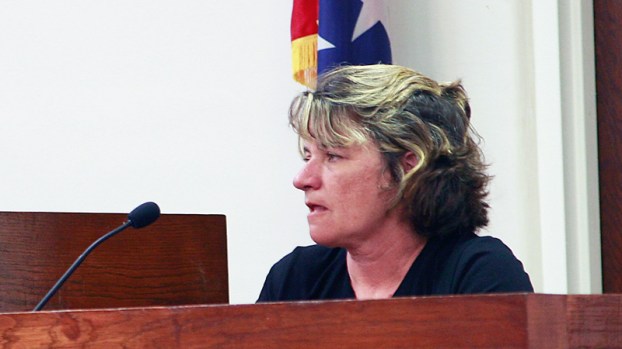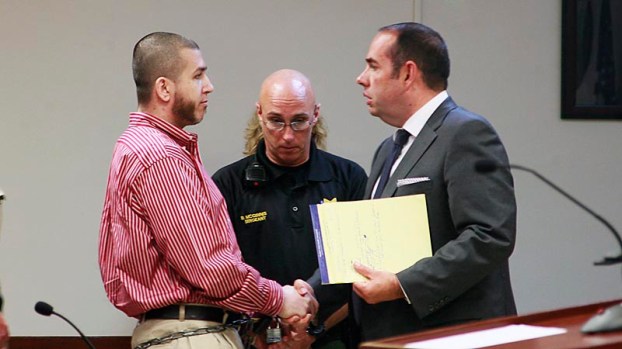Judge rules confession admissible in double murder case
Published 6:59 pm Wednesday, August 2, 2017
A judge presiding over a double homicide case has ruled the suspect’s confession to officers will be admissible in court and granted a request by the defense to postpone the trial to allow them more time to prepare.
Eric James Azotea, 45, of the Pinecrest community, faces charges of two counts of first degree murder, two counts of abuse of a corpse, and one count of tampering with or fabricating evidence. The charges stem from an investigation into the 2015 deaths of Arthur Gibson and Amber Terrell. The District Attorney’s office is seeking the death penalty against Azotea in the case.
Attorneys for Azotea filed a motion with the court seeking to suppress statements Azotea gave to investigators claiming officers violated his constitutional rights by continuing to interview Azotea after he had requested a lawyer. The District Attorney’s Office contends that Azotea chose to continue speaking with investigators by initiating those conversations and later rescinded his request for an attorney.
Criminal Court Judge Stacy Street heard testimony regarding the motion at two different court hearings in June. The interview with Azotea was video and audio recorded and a portion of the video was played during the hearings.
On Wednesday, Street issued a ruling declaring the confession to be admissible in evidence when Azotea stands trial.
Street noted that when investigators handcuffed Azotea, he asked TBI Special Agent Fraley “Are we done talking?” Fraley then replied that he would be willing to talk to Azotea and try to help him, but they couldn’t speak to him since he had requested a lawyer. Street said, in his opinion, that question by Azotea initiated the conversation.
Azotea later asked investigators about his girlfriend, Kristen Jones, and if she was being charged. Carter County Sheriff’s Office Investigator Mike Little replied that Jones was cooperating with investigators who were interviewing her.
Street said he initially felt that Little had “crossed a line” by telling Azotea his girlfriend was cooperating.
“In going back and listening to the tapes and reviewing what was said, the court finds that in asking about his girlfriend, Mr. Azotea initiated the conversation,” Street said.
At that point, Azotea told investigators he wanted to talk to them if they would not press charges against Jones. Fraley again told Azotea they could not speak to him unless he changed his mind about wanting a lawyer.
“The defendant proclaimed ‘F*** the lawyer,’” Street said. “The court finds that ‘”F” the lawyer’ is about as clear of a repudiation as you can have.”
Street then issued a ruling denying the defense motion to suppress the statement.
Azotea’s attorneys had also filed a motion requesting a postponement of the trial date. The case had been set begin the trial on Sept. 11 and was expected to last for two weeks.
Attorney Gene Scott told the court on Wednesday that the defense needed additional time to work with expert witnesses they intended to call to testify. Scott said they also needed time to review the large number of cell phone records which they recently received from the District Attorneys office.
District Attorney General Tony Clark informed the court he had recently been informed one of their key witnesses was having to take emergency medical leave and would not be available. Despite that, Clark said he was ready to proceed to trial.
Street noted that Sandra Terrell, mother of victim Amber Terrell had submitted a letter to the court asking to be heard and stating the family opposed the trial being delayed. Sandra Terrell was in the audience on Wednesday, and Street called her up and placed her under oath so the court could hear her request.
Sandra Terrell read from her letter as she cried on the witness stand. She noted how her family has had a hard time dealing with the loss of Amber and only weeks ago she also lost her husband, who died in a car crash.
“We just want to get this behind us, so my daughter and husband can rest in peace,” Sandra Terrell said.
Street said he understood the family’s stance on delaying the trial, but the court had the responsibility to ensure the defendant received a fair trial, particularly in a case involving the death penalty.
“The only thing worse than trying one of these cases once is having to try one twice,” Street said.
Street granted the motion to delay the trial and set a new trial date for Feb. 5 through Feb. 16.




